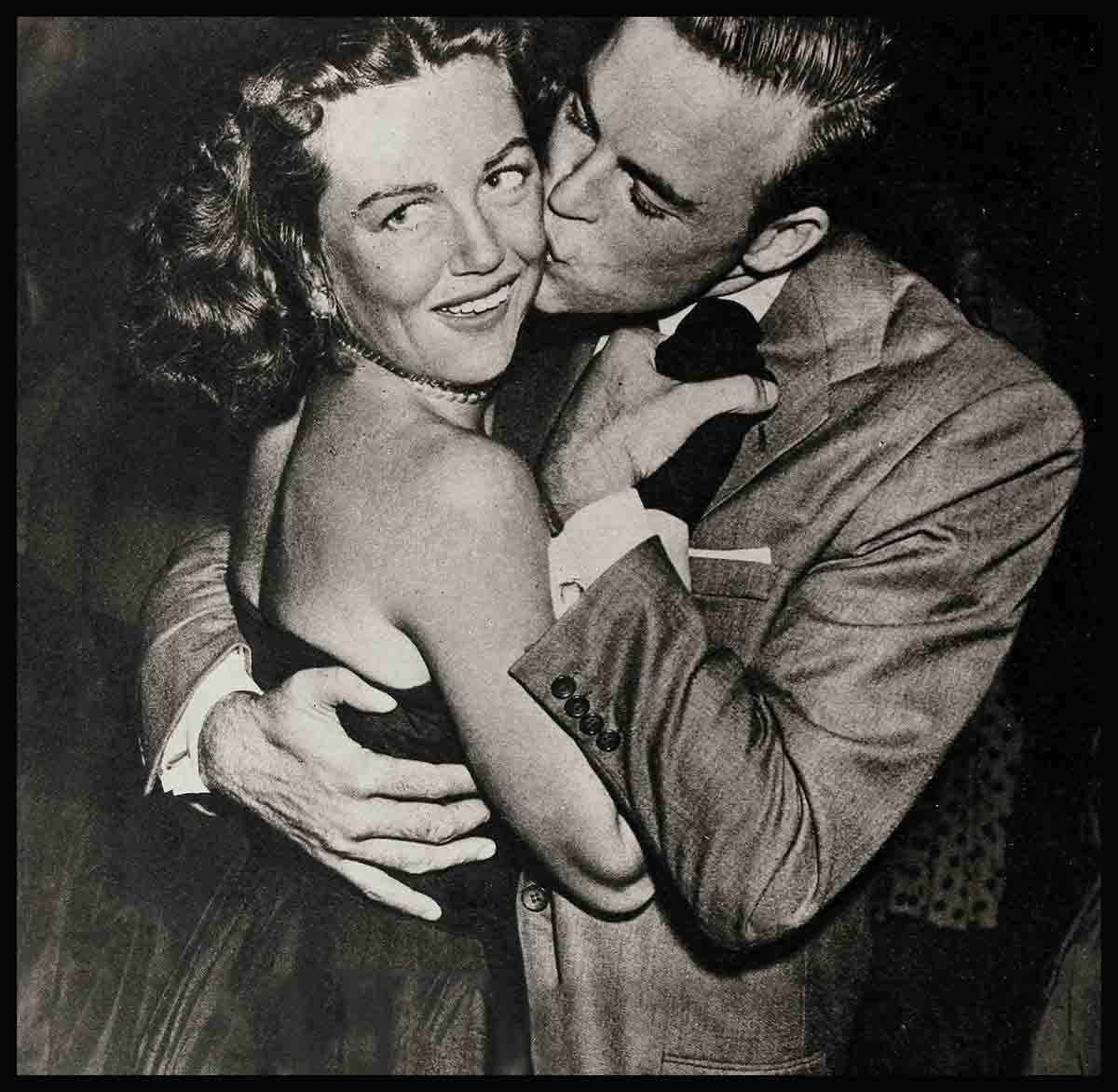
Down, Boy!—Scott Brady
Scott Brady, his long right leg flung over the arm of a chair, his fingers drumming an angry tempo on the edge of the table, sat quietly glowering. He got up a couple of times and walked around the room, apparently in deep thought. Finally, he pointed a long finger and shook it.
“There’s a lot of baloney going around about me,” he growled. “You reporters, and a lot of people in this town are messing up my life. The only reason I haven’t complained before is that I don’t want people to think I’m crying. If you want to know the real truth about my love life—and a few other things—just shut up and listen for a few minutes.” Brady stalked around the room gathering his thoughts. His trousers clung neatly to his narrow hips and were cut all right, but it seemed they should be tucked into high heeled boots, regular Tombstone pants. His tweed jacket appeared to be an excellent hiding place for guns, and his shirt was open at the throat, the way a man would wear it if he expected action.
We sat back and did as he said.
As Brady walked up and down he began to look very sorry for himself.
“How do I get this kind of a reputation?” he said. “I hear I’m fickle. Well, I’m a single man and I go out with quite a few girls. But many of the girls I date have been pals for years. I might meet a new girl, like her, and try to get her to go out with me like any other guy, but I’m not fickle when it comes to my old friends. Why, I’ve never even dated a girl for the publicity department—and darn few actors can make that statement. And that includes Ann Blyth. That rumor was really unfair. I like Ann very much, but it got so we didn’t dare be seen together, because the columnists jumped down our throats for trying to fool people by going out just to make an appearance for the studio.”
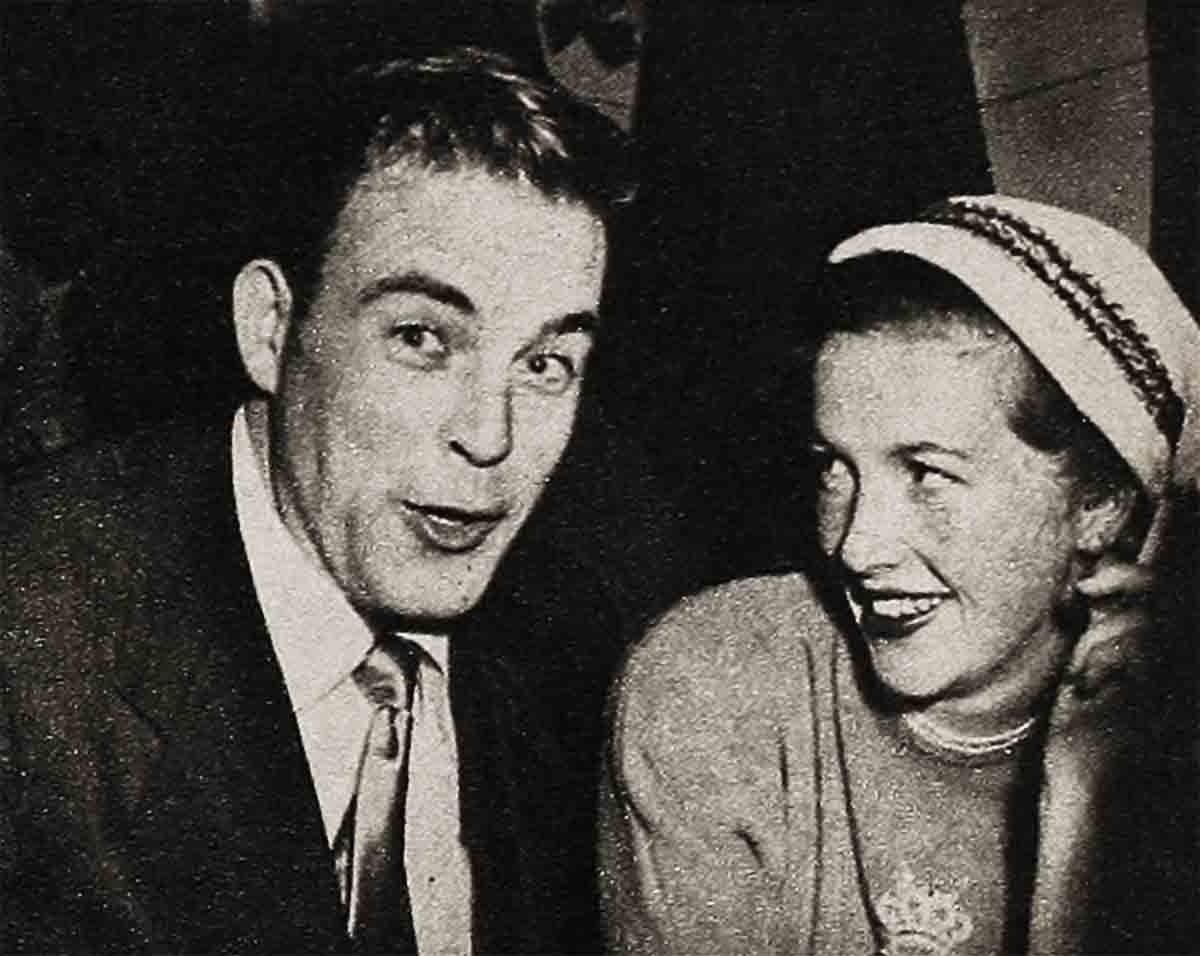
We suggested that maybe he was contending, then, that he was very fond of all of the girls he’d been linked with in the past couple of years. Real fond.
“That’s silly,” he snorted. “But how can you tell unless you check? In Hollywood there are more single men than single women actually, but the movie people stick together, maybe because we’re all in the same line of work. And the single actresses do outnumber the single actors. That means we’re what you might call overworked. So if I seem to go out with a lot of women it’s just that I’m trying to do my bit—and, incidentally, not overlook any bets. But I can say that I’ve never gone out with the same girl twice unless I really liked her.”
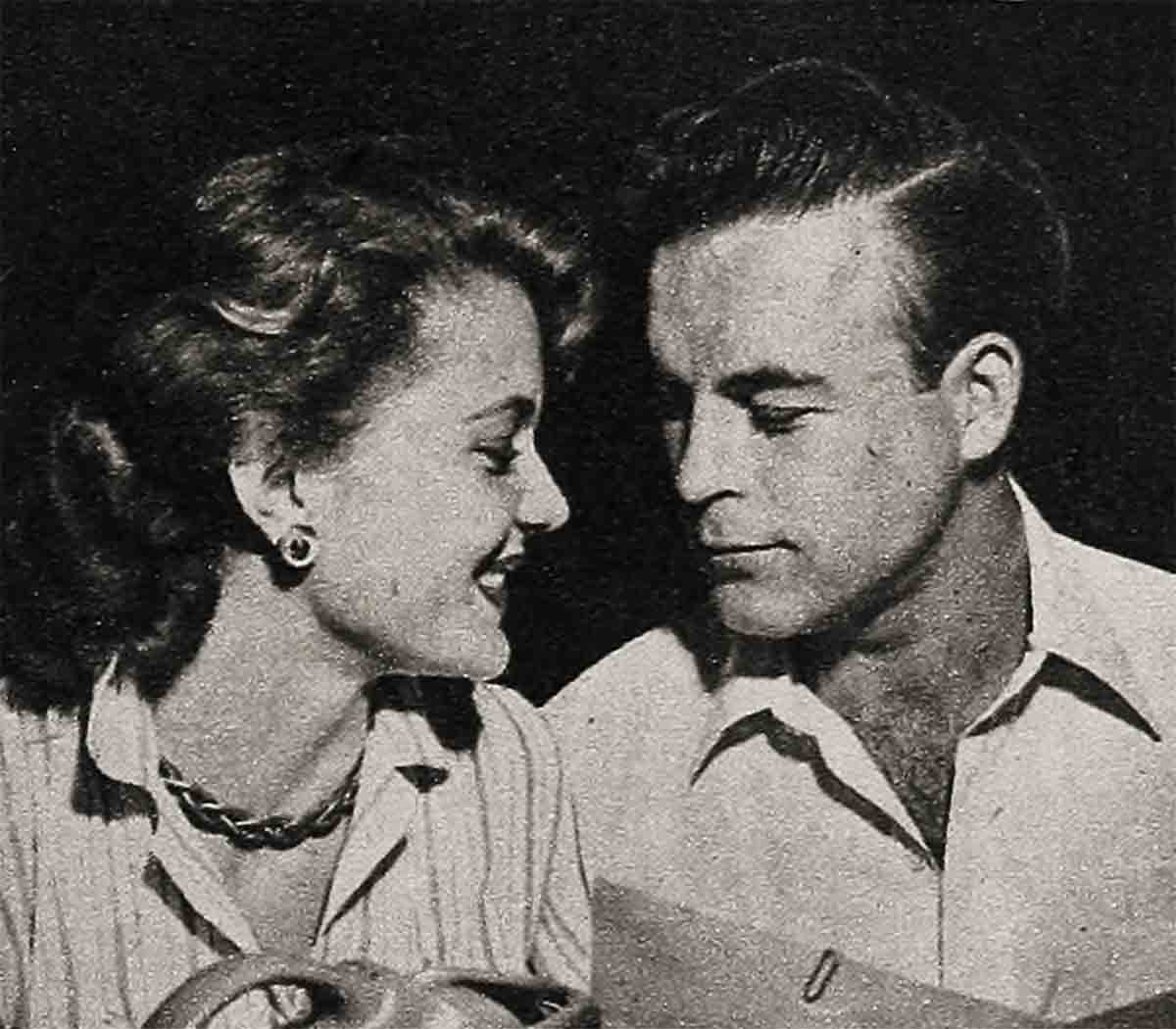
Brady kicked a little lint off the carpet and made an expression like Bishop Sheen starting a lecture.
“Do you know what the result of all this kind of talk about me and other actors is going to be?” he asked. “The fans who come to Hollywood to see the stars are going to be able to get a look at more of them in Kansas City. They’re all going to be in hiding. They’ll be afraid to go out, for fear of being lynched. The sightseeing buses will all go out of business. The drivers will be pointing out Mocambo and such places as former night clubs. And the press agents for those night clubs, who plant all the hot stories on guys like me, will be selling apples.
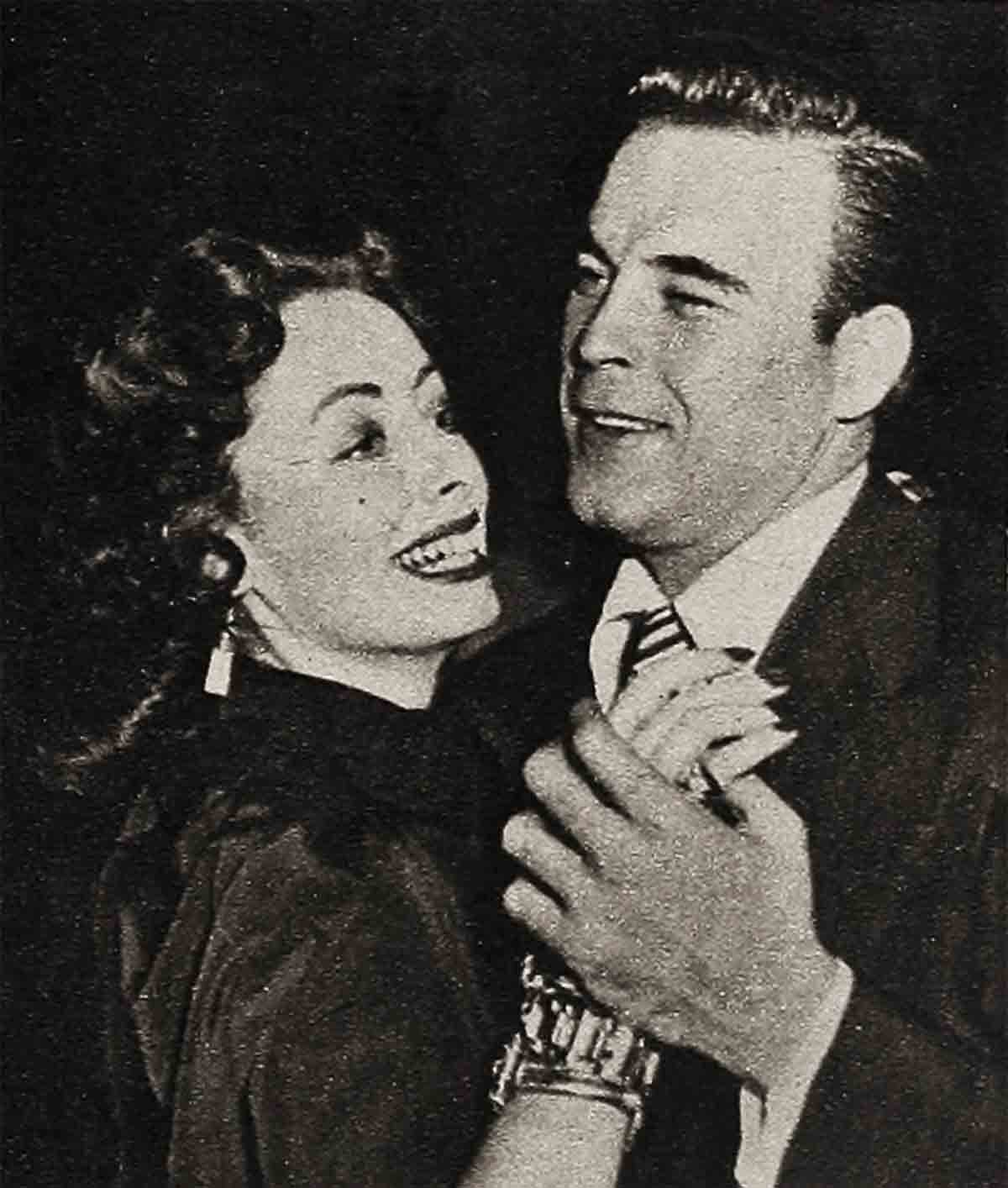
“Maybe it is the press agents who should be blamed, anyway. One week when I had the flu I counted the items in the columns serviced by those press agents and I was listed as being in 45 spots with about 45 different dames. My agent was going crazy. He kept calling me up, raising the devil. ‘I’m telling the studio you’re sick in bed,’ he screamed, ‘and every time I pick up a paper I see you’ve been out dancing. What are you trying to do to your career?’ And the girl I was going with—and whom I didn’t want to see because I didn’t want to give her my flu—call every hour and told me to die that day. And all the time I hadn’t lifted my aching head from a pillow.”
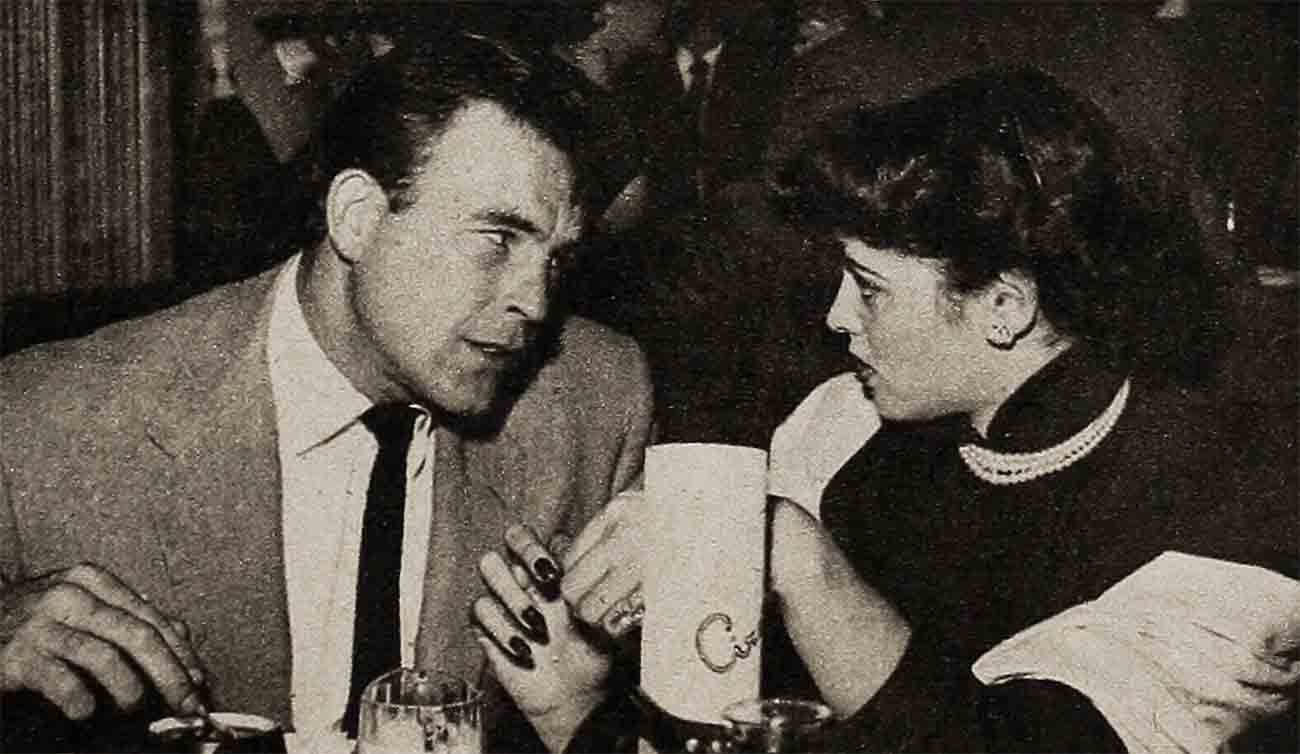
We began to feel very unhappy about Brady. Maybe the man was misunderstood.
“Put this down,” he demanded suddenly, “if you’re going to write anything about all this, tell the truth. I’m a simple man trying to make a living and doing my best to learn my business so I can work at it until I’m an old man. I am not a troublemaker. I am not fickle. I never give a producer any trouble. I have to stand up for a few rights—and I have to make my own decisions about my career. But a man has to do that in any business.
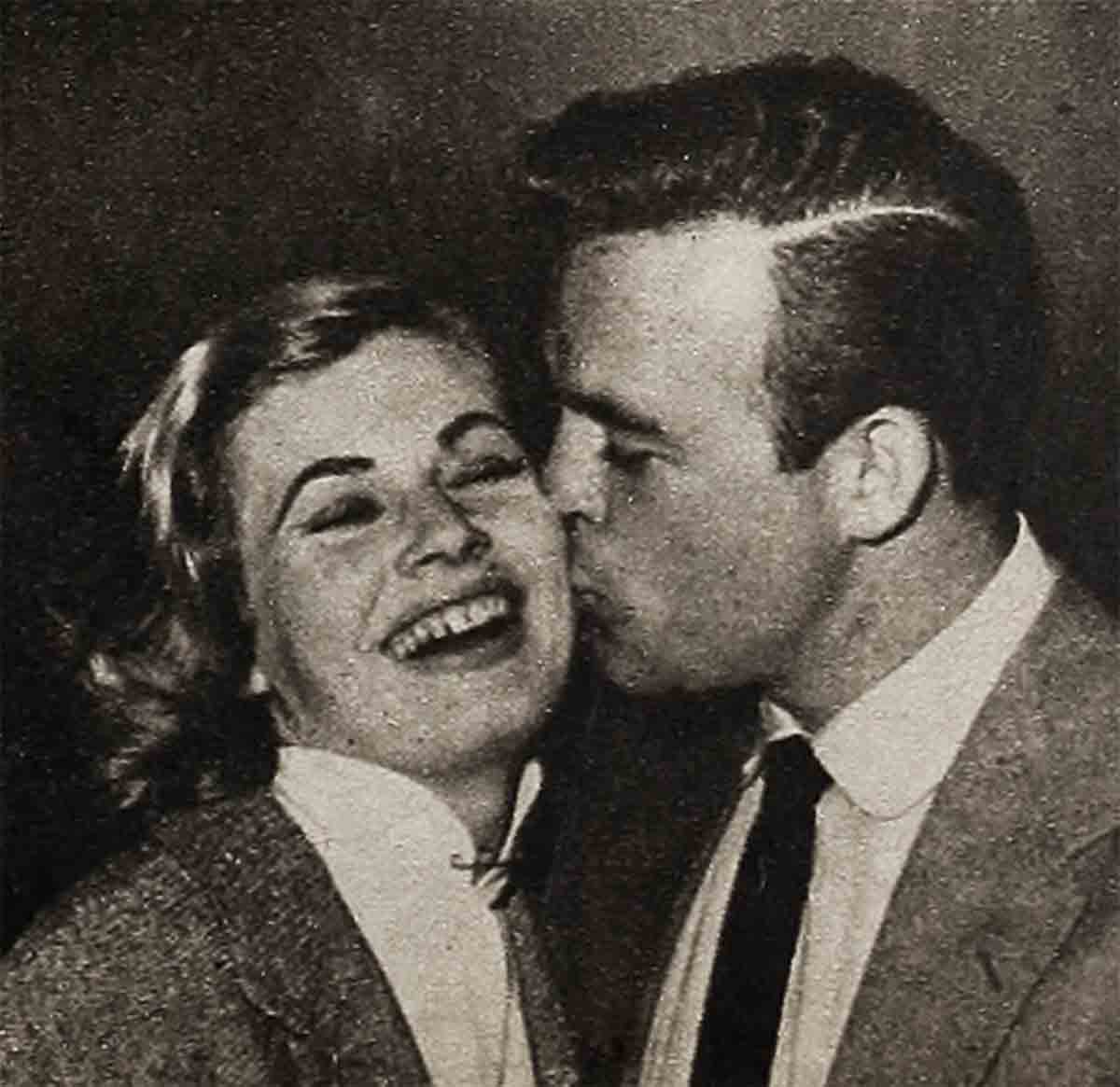
“And put down particularly that I will never be a long-hair.” (In Hollywood parlance it is said of an actor that whenever he kicks over the traces and gets into a fight with his boss, that he has gone “long-hair.”) “I don’t want to play Hamlet or be another Charlie Chaplin. I will play any part a studio asks me to if I think I can do it and it won’t take me backward instead of forward. I would like to spend the rest of my life doing domestic comedies, light little guys who work in factories and have to hurry to work every morning, just like the people who go to the movies. Once in a while I’d like an action movie—a western or something like that. But I’ll leave the acting parts to the big actors, the guys who like that sort of stuff and know how to do it. I don’t.”
We meekly interrupted to suggest that from current reports Scott Brady had set some sort of a record for kicking over the traces. Within a matter of days, a few months ago, he ran afoul of both 20th Century-Fox and Universal-International, and made the final payment on a contract he bought out of at Eagle-Lion. For a few days it had looked as though Scott were trying to be a one-man revolution, and the word had got around that Scott Brady was at last a long-hair, a bad boy, a man who wanted his way or else.
Scott narrowed his ice-blue eyes at us. He ran a strong hand through his already uncombed hair. And he began talking at his usual machine-gun rate.
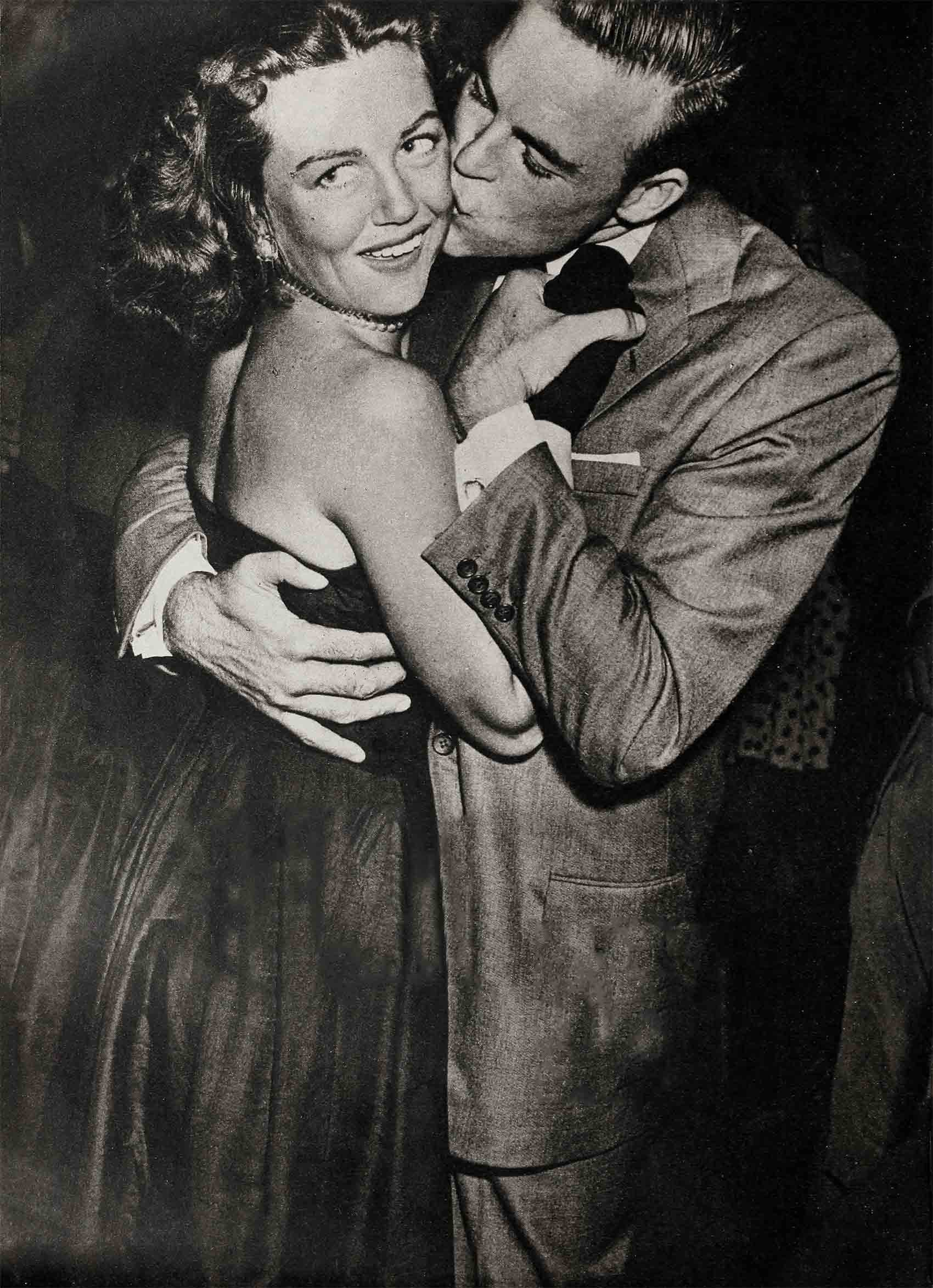
“If you want to know the real truth about my dealings with Fox and Universal, you’ve got to know what preceded all this,” he said finally. “You see, both the Fox and Universal deals came as a result of the mess I got into with Eagle-Lion. Now that was all my fault. When I got out of the service I came to Hollywood because my brother (Larry Tierney) was here, and the rest of the family was planning to move to California. I had no job—and nothing in mind—so I just took it easy around town for awhile, a few months.
“One day I was in a restaurant and a fellow walked up to me and asked me if I was an actor. I told him to get lost, but he insisted on talking to me, and the next thing I knew I was on my way over to Eagle-Lion studio. We went into a little office and a man sat at a desk behind a. big cigar and just looked at me. He didn’t say a word for ten minutes. Eventually, he seemed to make up his mind, and he turned to the fellow with me—who was an agent—and said he’d like to talk over a deal.
“I found out right then that actors aren’t supposed to have any sense, because they asked me to step outside while they figured out what they were going to do with me. That sounds kind of crazy, but that’s the way they do things.
“Well, to make it short, they ‘made a deal,’ and the following morning I was an actor, maybe a star, at Eagle-Lion. It was as easy as that.”
Brady plucked a cigar from a pocket and bit the end off and lit a match. And then his entire manner changed. He didn’t look menacing anymore. His face wrinkled into a wide grin and he sunk into a chair chuckling like a small boy. He played with the cigar as though he wasn’t used to cigars.
“Boy what they did to me at EagleLion,” he said. “I’m not complaining, mind you, because if they hadn’t given me a chance I might be installing your telephone here today or picking up your laundry. But I became an actor fast over there. The first picture I was a prize fighter—and I was terrible. But everybody kept telling me I was great. I guess if they hadn’t I’d have left town in the middle of the night. Then I was a T-man. Pretty soon I wasn’t sure what I was supposed to be I was working so fast and in so many movies.
About this time I began to get wise to some facts about Hollywood. I learned, from just looking around me, that an actor in the movies has to conserve his activities. They say you only last about seven years and I could see myself using up the whole seven years in about two. Sure I was getting experience, but it was killing me off. I was making pictures so fast that I wasn’t making any sense in them. And I wasn’t making any money. So I decided to make a change.”
Brady wagged the cigar as though it was a big stick.
“From that time on,” he said, “people thought I was a trouble-maker. I got myself two new contracts, one at Universal and one at 20th Century-Fox. I’ve worked hard at both places. Recently both contracts were called off—and the stories around town about how it happened would curl your hair. I hear that out at Universal I got into such an argument with Bill Goetz that he threw a book at me and chased me out of his office. They tell me he said I was a bad boy who got too big for his britches, and that I wanted to play roles I wasn’t able to. The fact is that Bill Goetz and I separated on the friendliest of possible terms—and never had a harsh word then or ever.
“At 20th Century-Fox they had a clause in my contract that I couldn’t do television. I wanted to do TV and I did. That broke the contract. I’m sure I’ll work there again some day, because I have a lot of friends out there,”
Brady flung his cigar, well chewed now, into the fireplace, and stomped up and down to keep his dander going.
“But that isn’t the worst of it—being called a long-hair. They have me nuts now about my private life. Take for instance the stories that were in the papers recently about me and Anita Ekberg. The Way it went was that she and I went to Mocambo, I criticized the way she was dressed, we had a knock down-dragout fight and she stormed out of the place in a huff, leaving me alone. How about that?
“What actually happened was that we went to the Bar of Music, not Mocambo, she had been in a hurry to dress and wore a nice suit. We found out it was an opening night after we got there and that everyone was in evening clothes. We sat down, laughed like the devil for about ten Minutes, and then left for some less fancy place together. And we had a wonderful evening.
“But the papers made me look like a real Jerk. Look, if I like a girl I don’t care if she goes out with me wearing blue jeans and a T-shirt, as long as she looks good. I certainly wouldn’t start a beef with a pretty girl in a public place—although the word is around now that I’ll slug a woman anywhere. Jimmie Fidler wrote me an open letter in his column that made me hate myself even though I knew all the things I’d been charged with were not true.”
Up to this point Brady had been tensed up like a panther on the prowl, and had looked about as dangerous. But at this Moment he pulled one of those abrupt about-faces that make him so darned fascinating and likeable. He ‘grinned his wide Irish grin and came straight over to us.
“Maybe you’re the guy to set the record straight. Maybe you’re the guy to write the truth about me—and my reputation. Just tell them what I’ve been saying, about my job, about my girls, about my wild, wild ways.
“And another thing. Tell them that I’ll be my own man. If I do crazy things, that’s me doing them. Not an actor trying to attract attention. I won’t try to establish any off-screen character that is not me. I will not assume any eccentricities. If guys like you tell the truth about me, people will know what I’m really like and I won’t be in so much trouble.”
Brady came over and looked at us closely. He gave us a pat on the head that could almost have been interpreted as a blow.
“Now, don’t louse me up,” he said. “I’ve got to go. I’ve got to get another cigar.”
And he went, like a T-man who’d just spotted a smuggler.
We gathered the notes we’d scribbled and looked them over very carefully. They seemed to make sense—and the man certainly seemed to be telling the truth—at least the truth the way he saw it. But all in all he still seemed to come out something of a character.
Let’s see. Scott Brady does date more women than any three bachelor actors in town. He walks ahead of them generally, but they don’t seem to mind. He opens the car door from his side, not from the sidewalk. We’ve seen him grab a girl by the scruff of the neck and lead her through a night club door—with a smile on his face, all right, and generally a smile on hers. Maybe that’s his kind of affection. Maybe he is a bit of a roughneck with women. But they seem to like it and want to come back for more.
We’ve seen him walk into a conference room and say exactly what was on his mind, and pound a desk a little. He hasn’t always won, so maybe he is considered something of a trouble-maker by some producers. He certainly knows what he wants and means to do—and he does it. Possibly his idea of a simple discussion is another man’s idea of a knock-down-drag-out fight. Anyway, he’s no sissy.
He may not care what a woman wears, but Scott Brady’s date is generally as well decked out as any doll in the room, so maybe he’s a little more particular about appearance than he thinks he is. Who’s to argue, though, about that?
We believe Scott Brady, though, about not being a long-hair, or ever wanting to be one. We know he’s a business man about acting and likes to do the right things. He’ll never try for the Old Vic in London, for sure.
Now about being fickle. The man’s not that. If you’ll listen to him he’ll tell you his heart has really belonged to a girl named Dorothy Malone for a long time, and will continue to be hers until she’s entirely sure she doesn’t want it. The other girls. are pals, nothing more. But that’s his problem, not ours. It’s probably the only problem the poor guy’s got.
THE END
—BY JACK WADE
It is a quote. MODERN SCREEN MAGAZINE JULY 1953




